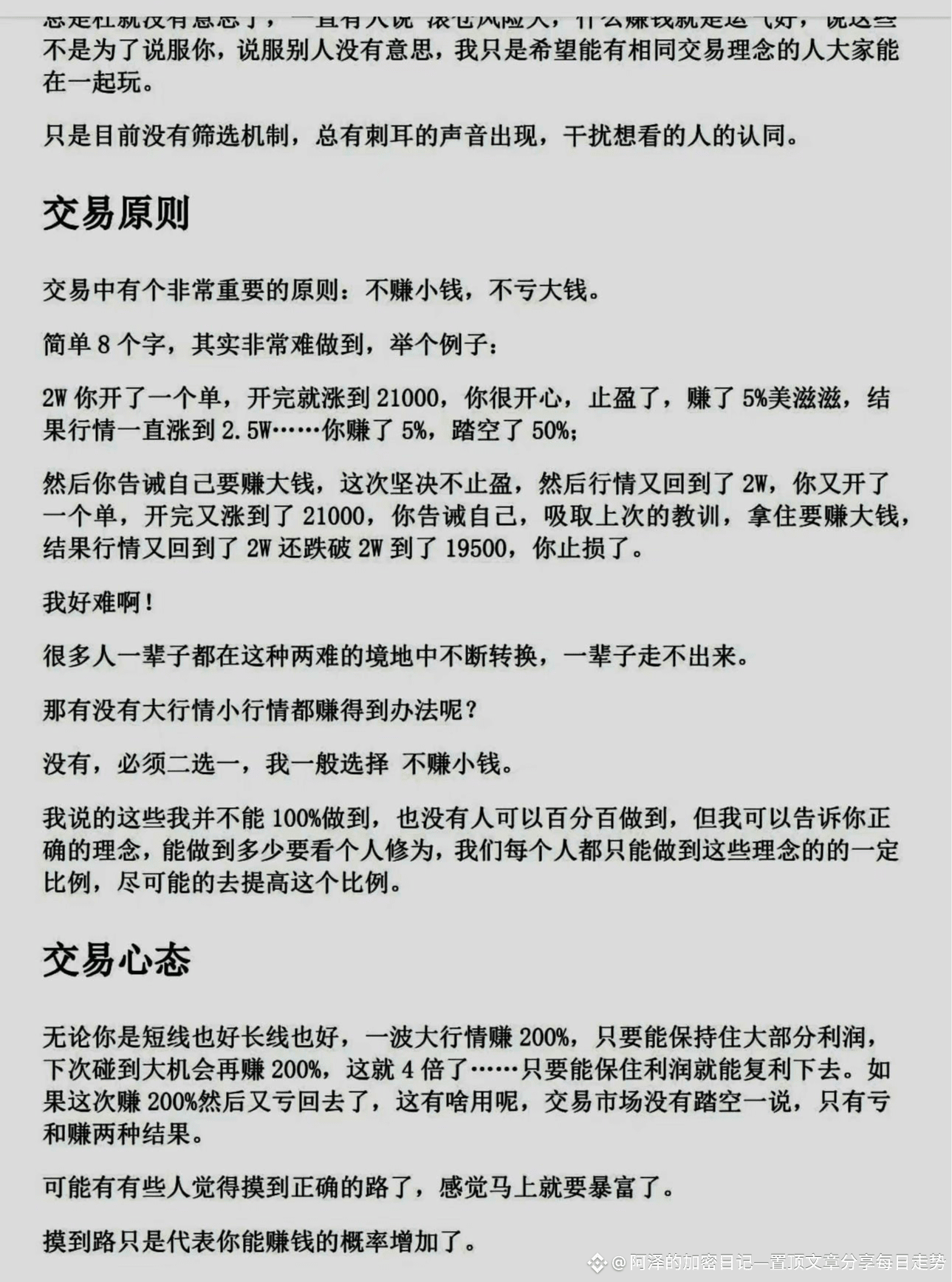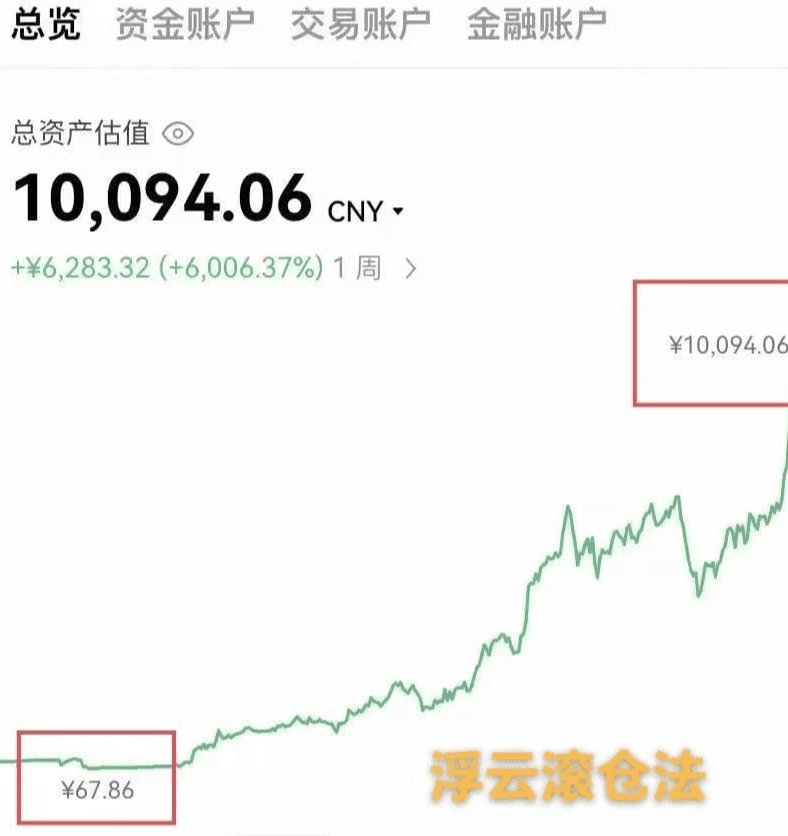Theoretically, this operation is feasible.
However, when you actually step into the market, the situation may change. You might become enthusiastic about high-frequency trading, attempting to earn more profits, and thus open and close positions back and forth in the market.
Many traders have a delusion that everyone is participating in the same trading game. Seeing trading masters achieve wealth levels of A8A9, they believe they can do the same. Once they can't, they fall into anxiety, depression, and frustration. But in reality, everyone's qualifications are different. Some people are naturally impatient, while others are calm and steady. Not to mention the different environments they enter, even if they have the same trading understanding, the final results can vary greatly. So you need to understand that you should compare yourself to yourself; how much others earn has no relation to you.
Trading is like a fire ignited by desire. If you don't make money after entering the market, you will feel pain; after making money and then selling out, you will feel bored, and thus want to earn more money, leading you to re-enter and put yourself back in a state of uncertainty. Therefore, never let your hands itch and randomly open positions without discipline.
Some friends think that once they 'enlighten' in trading, they can instantly ascend and become trading experts. But as I said before, the endpoint of trading enlightenment is 'knowing one's fate.' That is, after understanding the underlying rules of the world, looking back at one's ordinary traits, and clearly realizing that one only has the ability to make small money. Not everyone can achieve financial freedom after knowing their fate. You may struggle your whole life and only run a small shop, making a little money, but so what? Contentment and joy are key.
Shorting at the top and going long at the bottom are both extremely risky behaviors. To capture that little bit of 'profit,' you need to endure tremendous psychological pressure. Especially for those who have been long and profited before, it is easier for them to feel anxious, uneasy, and regretful at this time. After all, this is a counter-trend operation. Therefore, instead of enduring these unnecessary pressures, it is better to wait for the trend to become clear before entering the market. The fish head may have meat, but to eat that little meat, you have to pay a high price, while the fish body is the most tender and easiest part to obtain.
In a volatile market, if you go long one moment and short the next, you will only be played with by the market makers like a monkey. You must be clear that your main battlefield is the trending market. In the absence of a trend, you should either stay still and wait for an opportunity or recuperate and gather strength. If you have already incurred heavy losses before the market clarifies, it is like losing half your soldiers before going to battle; when it is time to charge, how will you fight?
Your trading logic can be based on wave theory, Chan theory, moving averages, and other technical indicators, or it can be based on how much drawdown or how much profit you must exit based on capital management logic. But it must never be based on 'I think' or 'I feel.' Subjective willfulness can lead people to stubbornly refuse to admit mistakes and be delusional. More critically, it won't tell you when to admit your mistakes. This kind of thinking is not trading logic, but delusion. It's self-indulgent, just like thinking you will definitely win the lottery once you buy a ticket.
The process of building a trading system is essentially a process of discovering and solving problems. You should write down your troubles and then deeply think about the root causes of these troubles. Combine these reasons to find various solutions. Once you have resolved all your troubles one by one, your trading system will naturally form.
You clearly know the market will pull back, yet you can only watch helplessly; this is the cruel aspect of discipline, and it tests people the most.
When I stand on the tracks and a train is racing towards me, I will decisively jump off the tracks and let the train pass, rather than waiting for it to hit me. If I want, I can return to the tracks at any time.
In trading, when we clearly realize that we have made a mistake in direction and have already incurred losses, many people choose to wait in place, as if waiting for a train to crash into them. When we realize that we might have made a mistake in direction, or the market hasn’t proven that our operation is correct, we can exit first. Once the 'train' has passed, as long as the market continues to develop in the direction you expected, we can re-enter at any time. Remember, prioritize trend over price.
Learn to read with me ten times.
If you can't even protect your principal, how can you compound?
If you can't even protect your principal, how can you compound?
If you can't even protect your principal, how can you compound?
If you can't even protect your principal, how can you compound?
If you can't even protect your principal, how can you compound?
If you can't even protect your principal, how can you compound?
Compounding must be low drawdown; you cannot have large losses
Risking a little for a lot, using small stop losses to exchange for large profits.
If you harbor luck, you will undoubtedly fail.
Level and mindset are both indispensable.
First learn to minimize losses before you have the opportunity to make money.
If you are losing money and getting hit every day but still think your mindset is the problem, then you are also useless.
Who can maintain a good mindset while losing money every day?
Learn to minimize losses, not to lose, and then think about how to win
Learn to minimize losses, not to lose, and then think about how to win
Learn to minimize losses, not to lose, and then think about how to win
Learn to minimize losses, not to lose, and then think about how to win
Only by including small losses, small gains, and large gains while eliminating large losses can stabilize your own compounding curve.
I am A Xin, only doing real trading; the team still has spots available, come quickly.



